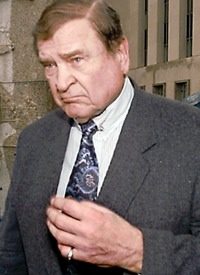
Famous for once saying that in Chicago, politics is “a blood sport,” former U.S. Representative Dan Rostenkowski, 82, passed away on August 11 after being diagnosed last summer with lung cancer.
Born Daniel David Rostenkowski on January 2, 1928 into a leading Polish-American family, his father was a Chicago alderman and he grew up in politics. After his education, which included a Wisconsin military school and Loyola University, Rostenkowski was an infantryman in Korea from 1946-1948. He was first elected to the U.S. House of Representatives 1958 after having served as a State Representative and State Senator. Rostenkowski was a Congressman for 18 terms before being defeated in 1994.
As House Ways and Means Committee Chairman, he was known as a “consensus builder and a master of legislative tactics” said the MyFoxChicago website:
As Ways and Means chairman, he handled the job in old-school fashion, once telling an Associated Press interviewer that those who crossed him legislatively “should not expect any largesse, so to speak, from me.”
But he believed in compromise and expressed dismay at the partisanship that descended on Capitol Hill after he left. He was fond of closed-door meetings where political dramatics were shelved in favor of deal making.
“We looked at politics as compromise,” Rostenkowski said. “We were going to work together. We were going to get something done. We were Democrats and Republicans but we were also legislators. Politics is war today. Everybody wants to fight. Nobody wants to give in.”
“As much as people criticize the back room, the dark room or the cigar or smoke-filled room, you get things done when you’re not acting,” he told an interviewer. In his day, he said, “we’d argue like hell on the floor of the House of Representatives but we were out playing golf that night.”
Former Secretary of Commerce William Daley — whose father was the late Richard J. Daley and whose brother is the current Chicago mayor, Richard M. Daley — commented that Rostenkowski “was the go-to guy for (Chicago) mayors. You didn’t go the senators, you went to Danny.” Rostenkowski felt his job was “bringing projects back to Chicago,” including major construction projects.
In a 1992 scandal, he was charged by a Washington grand jury with 17 counts “of misusing government and campaign funds.” He stepped down as Ways and Means Chairman. In 1994, he was then defeated by the first Republican Congressman from Chicago in 35 years, the unknown Michael P. Flanagan. In a twist of fate, Flanagan served a single term before being defeated by a Democrat, State Rep. Rod Blagojevich — the very same man who, as former Governor, is currently fighting his own political scandal in a Chicago courtroom.
In the end Rep. Rostenkowski did plead guilty to two counts of mail fraud, admitting in his plea agreement that he had used his congressional office funds for gifts such as armchairs and Lenox china, and had hired people as part of his political staff who did such work for him as lawn care, photography, and supervised his home’s renovation. Yet he insisted afterwards that what he did should not have been classified as a crime but just as “a violation of House rules.” After serving 17 months in prison, primarily at the federal correctional center in Oxford, Wisconsin, he afterwards addressed a prison reform group, joking about “my Oxford education.”
After driving the 1986 tax overhaul legislation — highlighted by his national television appearance where he urged viewers to send him their tax improvement ideas and, if they could not spell his name, to just “write Rosty” in Washington – the bill was later signed into law by President Ronald Reagan.
Said Rostenkowski at the time, “I think the epitaph I’d like to see, even on my gravestone, would be, ‘He wrote good law.’ That it was fair.”
After his prison stint, he amended this sentiment admitting that “his legacy would always be tainted by his stint in federal prison.”
“I know that my obituary will say, ‘Dan Rostenkowski, felon,’ and it is something that I have to live with,” was his thought in a 1998 Novak and Shields interview.
He was pardoned in 2000 by President Bill Clinton.
Photo of Dan Rostenkowski: AP Images



